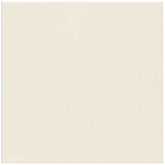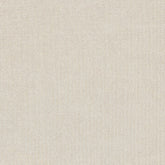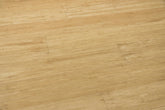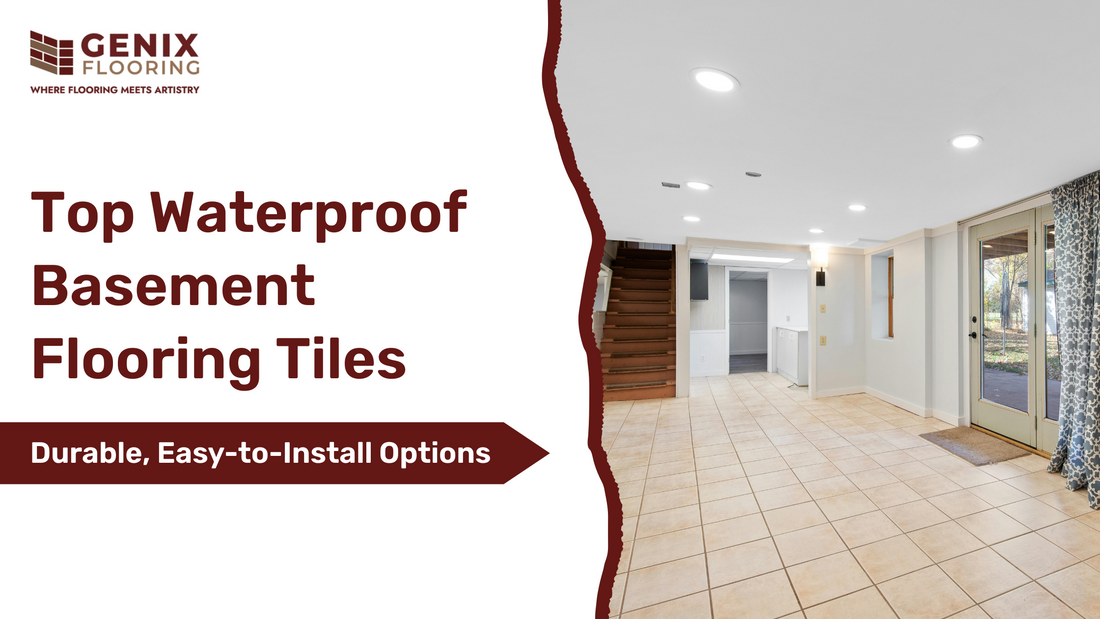Introduction: The Essential Guide to Waterproof Basement Flooring
Does your basement fight with moisture or spill here and there? The flooring should be selected accordingly, as it is not only important in terms of appearance. But its durability and sustainability in moisture content. Fortunately, there are fantastic water-resistant basement flooring options that blend tough performance with great style. Whether you're leaning towards sturdy vinyl plank (VP) flooring; resilient epoxy; or a variety of waterproof tiles for basement spaces; we've got you covered. This guide is here to help you find that perfect waterproof basement flooring for a dry; worry-free, and incredibly durable basement.
Why Choose Waterproof (LVP) Vinyl Plank Flooring for Your Basement?
Thinking about waterproof (LVP) vinyl plank flooring for your basement? It's a brilliant solution for basement waterproofing! These planks are ultra water resistant and are known to be extremely simple to install; which is why both the DIYer and the professional can have fun with them. Luxury vinyl tile (LVT) and other water-resistant basement flooring products are also a smart pick for flood-prone spots; thanks to their low maintenance and inherent water resistance. Plus, thanks to modern tech; waterproof vinyl flooring comes in tons of cool styles and designs to perfectly complement your basement's look. It’s a truly fantastic choice if you have flooring for basements that get wet!
Top Waterproof Basement Flooring Tiles & LVP Solutions
The thing is to select the right product. Here are some of the best waterproof basement flooring options available:
Daltile ProSeries™ Luxury Vinyl Tile (LVT)
-
Why it's Great for Basements: Daltile's ProSeries™ LVT is built for resilience; making it a top contender for basements susceptible to moisture. It is waterproof on the inside; so that when you accidentally fill it or when you have the tiniest amount of leakage; it will not affect the planks by causing warping or swelling; which is a huge advantage over classic hardwood or laminate!
-
Key Features:
-
100% Waterproof: Its core construction is a champion at resisting water damage; essential for wet basement flooring.
-
Durable & Scratch-Resistant: Stands up to foot traffic and everyday wear; a must for durable basement flooring.
-
Easy Installation: Features a click-lock system that makes simple DIY installation easy; cutting down labor costs. Perfect for interlocking basement floor tiles waterproof.
-
Low Maintenance: Simple to clean with a damp mop; fitting the bill for cheap waterproof flooring for basement needs.
-
Style Variety: Available in a wide range of realistic wood and stone looks to complement any basement flooring ideas waterproof.
-
Suitable for: Use in basements; in kitchens; bathrooms; foyers and any environment where moisture issues are a problem.
EMCORE™ 12 MIL Vinyl Tile
-
Why it's Great for Basements: Why it's Great for Basements: EMCORE™ vinyl tiles offer exceptional durability and a truly waterproof surface. The solid-core SPC construction provides a robust foundation; resisting warping and damage from moisture; making it a reliable waterproof floor for basement applications.
-
Key Features:
-
Solid-Core SPC Construction: It is highly resistant to water and very stable.
-
Waterproof, Stain-, Scratch-, and Dent-Resistant: It is designed to endure the basement environment.
-
Easy Installation: It is fitted using the Uniclic® Locking System that provides easy installation.
-
Suitable for: All interior flooring applications; including flooring for basements that flood.
Bedrosian's Tiles
-
Why it's Great for Basements: Bedrosian has many different styles of tiles to choose from, yet the tiles made of porcelain and ceramic are the most appropriate to use in a basement tiling. Porcelain tiles, known for their very low water absorption rates, are excellent for managing moisture.
-
Product Range: It contains both porcelain and ceramic floor tiles.
-
Key Features:
-
Low Water Absorption: It contains both porcelain and ceramic floor tiles.
-
Durability: Provides a long-lasting and wear-resistant surface.
-
Suitable for: Suitable for basements, bathrooms, and kitchens. The waterproof ratings of different products should always be checked.
Marazzi Tiles: Modern Renewal Parchment Glazed Porcelain Tile
-
Why it's Great for Basements: Marazzi's glazed porcelain tile is a premium choice for basements that demand both beauty and resilience. It is waterproof; scratch-resistant, making it manageable during the days or even in its exposure to moisture; and this makes it meet the qualification standards of the best tile for basement.
-
Key Features:
-
Waterproof, Scratch-Resistant, and Stain-Proof: A product that is resistant to high-traffic and moisture areas.
-
Elegant Finish: Provides a classy spirit to your basement premises.
-
Suitable for: Basement; kitchens; bathrooms; and any other place in need of a rugged yet fashionable flooring.
Happy Feet Regency 7" x 59.05" 8mm 20mil Stabilicor Plus (SPC)
-
Why it's Great for Basements: This Happy Feet vinyl tile is a standout for its 100% waterproof nature and added benefits like antimicrobial and slip resistance; making it a safe and hygienic choice for waterproof basement flooring options.
-
Key Features:
-
100% Waterproof: This is very important in avoiding water damage.
-
Antimicrobial & Slip-Resistant: Enhances safety and hygiene; crucial for flooring for wet basements.
-
Durable: Made to last in harsh conditions.
-
Suitable for: Basements, kitchens, and commercial spaces.
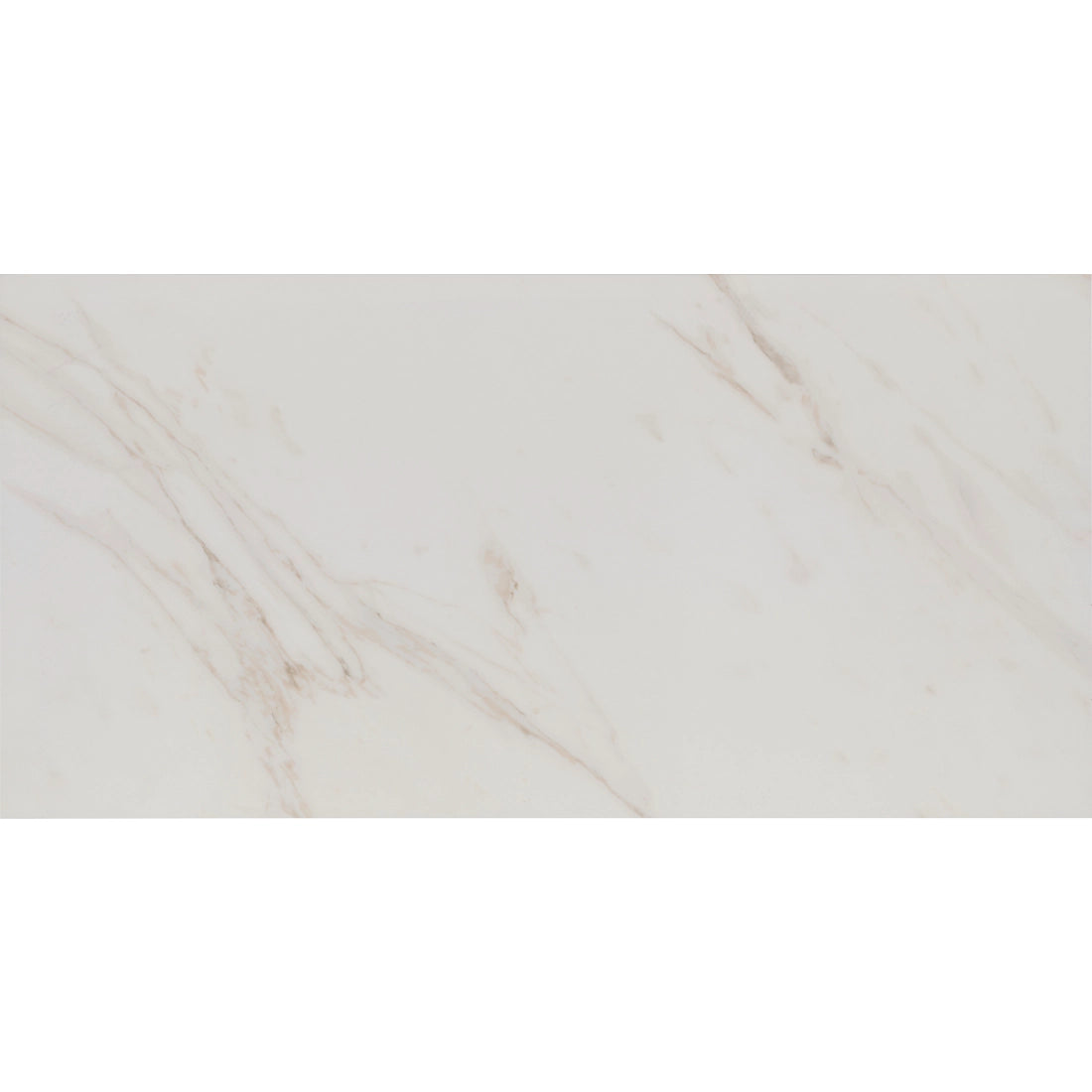
Buy Now
Flat 25% OFF on All Tile Floors — Shop Now
Stylish, durable, and affordable — this week only.
Is Tile Flooring Suitable for Basements?
Yes! Basement Floor tiles are one of the most widespread and effective methods to address the moisture problem. Tile flooring is celebrated for its glossy finish; mold resistance; and exceptional longevity. Waterproof tiles; particularly vinyl tile (VP) or PVC; are among the best water-proof options if installed correctly. The tiles also help to ensure that the basement space is well ventilated by letting air pass under them. For truly waterproof basement floors; consider porcelain or high-quality ceramic tiles.
Advantages of Waterproof Luxury Vinyl Plank and Tile (LVP/LVT)
Luxury Vinyl Plank (LVP) and Luxury Vinyl Tile (LVT) bring beauty and durability together; making them a top basement flooring choice. This kind of flooring resembles natural wood flooring or stone flooring; yet offers water-proof protection. Whether you use LVP and tile or standard VP; you get the best of both worlds; style and functionality. The main characteristic of these products is the thick cushion layer; which makes it comfortable to walk on; and thus this is ideal in areas which are heavily used or a home gym. They are a great solution for waterproof flooring for basement needs.
How to Water-proof Your Basement Floor Effectively?
Before choosing the flooring material; it’s necessary to waterproof your basement.
-
Seal Cracks: Start by sealing any concrete slab cracks and covering the same with a concrete sealer or paint that is of high quality.
-
Moisture Barriers: Consider adding plastic sheeting beneath your flooring or using a waterproof basement subfloor system to prevent moisture from penetrating.
-
Drainage Systems: Drainage systems are very crucial when there is a severe moisture problem; perimeter drainage systems will work well together with waterproofing solutions.
Do You Need a Vapor Barrier for Your Basement?
Yes, if you're laying down any form of vinyl flooring or laminate over a concrete floor, applying a vapor barrier is essential. It finds its use as a barrier against moisture that would probably seize the flooring goods and risk the occurrence of spoilage of mildew and water. This is particularly vital for basement flooring solutions like LVP and carpet tiles, which can trap moisture beneath them. This also addresses the need for waterproof basement flooring with a built-in vapor barrier.
Can Epoxy Paint Help Waterproof Your Basement?
Yes, epoxy is a powerful waterproof basement flooring solution. When rendered directly on a clean and prepared concrete floor, epoxy paint produces a rather hard, smooth, waterproof flooring that repels chemicals, abuse, and spills. It's a popular choice for home improvement projects due to its glossy finish and relatively easy application, making it a good option for a waterproof concrete basement floor.
Benefits of Basement Waterproofing
Waterproofing your basement not just safeguards your asset from water injury, but boosts the value of your home, too. By doing so, you can increase the amount of usable space in your basement if you convert it into a home gym, entertainment lounge, or home office. With proper flooring products and Basement waterproofing efforts, you save yourself from money-draining restoration in the long run.
How to Install Waterproof Basement Flooring?
Installing waterproof basement flooring generally involves these key steps:
-
Check for Water Issues: In case your basement is prone to water, the first thing you need to check is drainage and sealing. Use epoxy or a vapor barrier if necessary.
-
Select Your Flooring: LVP, interlocking tiles, luxury vinyl, or durable tile. Choose your preferred type: LVP, interlocking tiles, luxury vinyl, or durable tile.
-
Verify Subfloor Condition: Ensure the subfloor is clean, dry, and level. In the case of concrete, look at a self-leveling compound, where necessary.
-
Installation: Choose the snap-on or interconnecting systems to have easy installation options; or you can use the guidelines provided by the manufacturers for adhesive or tile installation. For interlocking basement floor tiles waterproof, ensure a tight fit.
What Is the Best Subfloor for LVP Flooring?
For LVP flooring, a clean, dry, and level concrete slab works best. However, if your basement is prone to flooding, consider adding a subfloor system that includes PVC plastic layers or raised panels. These can be used to give air passage underneath; enabling the floor to be stable and dry. This is also a consideration for basement floor systems.
Are Interlocking Floor Tiles Easy to Install?
Yes! Snap-together or interlocking floor tiles are among the best-suited for DIY installations. These are usually tiles that clasp together with no glue used; and are usually made of PVC or rubber. They are very convenient when remodelling of bthe asement is done to create a workshop, a gym or a play area and provide an ideal basement tiling.
What Tools Do You Need for Basement Floor Installation?
For typical waterproof basement flooring types, essential tools include:
-
Tape measure
-
Utility knife (for LVP or vinyl tiles)
-
Rubber mallet (for interlocking tiles)
-
Spacers (for expansion gaps)
-
Underlayment (if required for laminate or some vinyl)
-
Roller (for pressing adhesive flooring)
-
Level and chalk line
What Are the Maintenance Requirements for Ideal Waterproof Flooring?
Waterproof vinyl flooring & laminate products are typically low-maintenance. Sweep or vacuum frequently to pick up debris. Most types of vinyl floors are simple to clean with a damp mop.
Waterproof vinyl flooring and tile products are typically low-maintenance.
-
Regular Cleaning: Sweep or vacuum routinely to collect debris.
-
Damp Mopping: Virtually all forms of vinyl and tile floors are relatively easy to wash using a damp mop and a mild detergent.
- Avoid Harsh Chemicals: Uncleaners of bleach type and abrasive cloths are especially avoided because they can destroy the finish or adhesive. Read the care label of the manufacturer.
How to Clean (VP) Flooring?
To clean LVP flooring, use a soft mop and a mild, pH-neutral cleaner. Hard chemicals and abrasive pads should be avoided as these will either distort the surface or destroy the wear layer. Regular care guarantees the floor stays immaculate and resists water damage.
Are Rubber Flooring Easy to Maintain?
Rubber flooring is an excellent option for a home gym or basement workshop. It is waterproof, cushioned and resists mildew. It’s also easy to clean and requires minimal upkeep, making it a great choice for waterproof rubber basement flooring.
What to Avoid When Caring for Basement Floor Tiles?
One should not use a lot of water when cleaning basement floor tiles as well as sharp bleach-like cleaners. They can undermine the finish, or they can disintegrate the adhesive beneath the tiles. Check individual care instructions as given by the manufacturer.
Can I Use Carpet Tiles in My Basement?
Carpet tiles can be used in a basement if it's properly waterproofed. They provide warmth and comfort, but they are generally not the best choice for areas with active moisture issues unless they are specifically designed as waterproof basement carpet tiles. Ensure a dry, sealed subfloor and consider specialized moisture-resistant carpet tiles if opting for this solution.
Pros and Cons of Carpet vs. Vinyl Flooring for Basements
-
Carpet Tiles:
-
Pros: Easy to fit and to change, they are soft to walk on, and soundproofing.
-
Cons: Not suited for areas prone to flooding, demands a dry, sealed subfloor, and can retain odors if exposed to moisture.
-
Vinyl Flooring (LVP/LVT):
-
Pros: Tend to absorb more water, damage to fabric can be permanent, not very easy to take care of, and limited number of choices.
-
Cons: Can be harder to install than carpet tiles if not using click-lock, may not offer the same level of softness.
How Do Carpet-Tiles Compare to Vinyl Flooring?
Where carpet-tiles are comfortable, vinyl flooring is best in moisture-prone areas. Vinyl-plank and tile products are waterproof, low-maintenance, and longer-lasting than traditional carpeting.
What Are the Costs of Waterproof Flooring?
Prices vary based on material and quality:
-
Luxury Vinyl Plank (LVP): 2–6/sq. ft. (A popular choice for waterproof vinyl flooring for basement projects).
-
Epoxy Coating: 3-7/ sq. ft. (A good option for a waterproof concrete basement floor).
-
Tile (Porcelain/Ceramic): 1-10+/sq. ft. (It is great as waterproof basement tiles).
-
Rubber Flooring: 3–8/sq. ft. (Great for waterproof rubber basement flooring).
-
Waterproof Laminate: 1- 4/sq. ft. (Can be a cheap waterproof flooring for basement option if specific types are chosen).
Luxury Vinyl vs. Traditional Tile for Basements
The luxury vinyl flooring rather than the traditional tile flooring is mostly easier to clean and manage, especially during installation and most of the time they prove to be less permanent. Both are excellent waterproof floors for basements, but they vary based on comfort, price, and installation complexity. Porcelain is; in most cases, the recommended type of tile to use in case you want a waterproof tile for basement floor.
Average Cost and Budget-Friendly Basement Flooring Options
Generally, waterproof LVP ranges from
3–6 per square foot, making it one of the more affordable and practical solutions for basement waterproofing projects. There are also other low-cost alternatives such as laminate, plain vinyl, and PVC-interlocking plastic tiles. They give a presentable look with easy waterproof protection.
Conclusion: Your Dry, Beautiful Basement Awaits!
Planning to work on home improvement about your basement will involve choosing the flooring for basement that floods or is prone to dampness. It is important to select the materials that cannot be spoiled by water, are easily cleaned, and make your place more attractive. Whether you opt for LVP, water glass tiles, or carpet tiles, ensuring proper waterproofing and selecting the right basement flooring tiles is the key to a successful and dry basement makeover. Genix Flooring provides varied choices of their strong, fashionable and waterproof options to match any basement.
